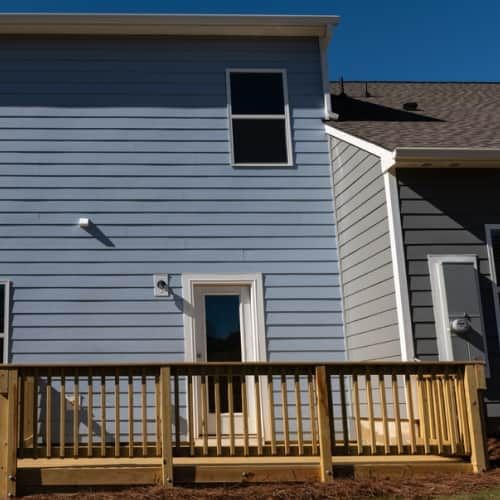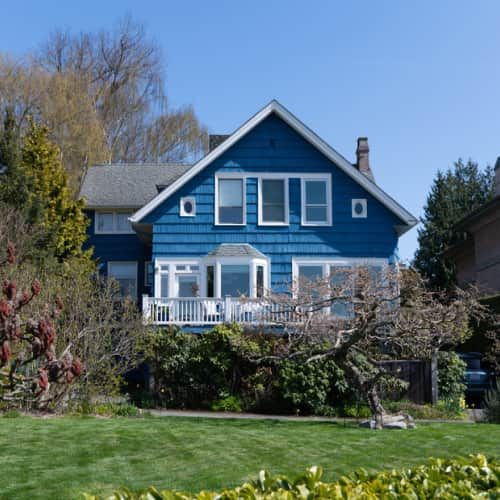Getting the right pulse rate monitor
The elderly individuals who are looking to get on the fitness track without causing any injury should definitely consider a pulse rate monitor for steady usage to monitor their heart rate levels. Hear...

By Modern60
Last Updated on,
September 30th, 2025

Finding an ideal home for retirement can be a pleasant and stress-free experience, with many nonprofit organizations and government agencies offering affordable houses for rent for seniors so they can live comfortably in their golden years. From assisted care facilities with dedicated staff to individual townhomes you can share with others your age, here are some of the best housing options for senior citizens.

If you’re over 55 and prefer living on your terms, you might not want to move into an assisted living rental facility that requires you to follow a fixed routine with other seniors. In this scenario, renting an independent townhome is best. It allows you to move about freely and pursue your hobbies and interests without being restricted to a schedule.
One drawback, however, to having a townhome all for yourself is the higher cost. Retirement colonies rent out independent living townhomes and housing options for $1,500 to $6,000 monthly. How much you pay exactly will depend on factors like the property’s location and amenities. Due to a higher cost, independent living isn’t the most affordable housing option for senior citizens. But it’s worth considering if you want to live freely and have been saving for retirement.
Co-housing is suitable for seniors who want a private living quarter but are okay with sharing common areas for recreation. The socially active atmosphere allows you to remain engaged physically and emotionally. This can be a significant benefit considering many struggle with loneliness later in life. Co-housing is also cheaper than renting an independent townhome, making it ideal for seniors who aren’t financially secure.
Townhomes that are part of a residential or gated community come with the perks of low maintenance. They also offer shared on-site facilities well worth the rent, such as laundry rooms, fitness facilities, parks, emergency maintenance services, and even healthcare assistance. The available amenities and the total square footage of a unit will determine the cost of renting a townhome in a community residence. Housing options in this arrangement start at $800 per month and go well upwards of $4,000 per month on average. These units are also listed for sale on broker platforms in case seniors want to buy a home.
Unlike an independent condo or apartment, townhomes are gated senior living communities that usually have a dedicated services and facilities manager on site to provide one-on-one assistance with maintenance and repairs. This benefits seniors who cannot perform or coordinate these tasks by themselves.
When opting to live in a gated community townhome, remember that there may be restrictions on how many guests you can host. Sometimes, access is limited to the families and friends of the residents. That said, you can consider such a home for retirement, given the perks inclusive of the rent.

Seniors often find it challenging to climb stairs due to age-related health and mobility issues. So, it makes sense to move from a multi-story apartment to a smaller place, like a ranch-style townhome. This single-story home has a wide floor plan and fewer walls separating the different rooms. The open space allows you to move around freely and install your utilities as you like for easy accessibility.
Ranch-style townhomes might be available as independent units or in a residential community, so you can choose an arrangement that fits your needs. The latter is suitable if you love interacting with others and are okay with sharing amenities. You also won’t have to worry about repairs and maintenance as the residential community employs someone you can call for assistance.
One-level senior townhomes generally offer all the perks of a modern home. But since they’re slightly more premium and luxurious, consider them only if your budget permits.

Many nonprofit housing organizations offer affordable housing for seniors on a budget. These are usually in the form of condos and apartments in community residences. A significant advantage of moving into a low-income house is that the rent is calculated based on how much you earn or your adjusted gross income (AGI). Most low-income senior homes for rent charge only 30% of your AGI. So, if your monthly income is just over $1,200, the rent for a condo will be no more than $360.
Although low-income houses help seniors save money, they don’t compromise on safety and facilities. The buildings are designed and renovated to offer elevators, emergency assistance, and active monitoring for seniors. That said, you must meet specific age criteria to qualify to live in such establishments. For instance, most organizations offer subsidized housing for people aged 55 and older.
Volunteers of America (VOA) and Mercy Housing are two popular nonprofits offering affordable homes for rent for seniors. VOA has a massive network of over 484 properties spread across 40 states. On the other hand, Mercy Housing has helped over 152,000 people, including senior citizens, find an affordable and secure place to stay. To help its residents live wholesome lives, Mercy Housing also offers wellness programs and encourages community interactions.
The Department of Housing and Urban Development (HUD) offers many programs to help older people find affordable housing, reducing their financial burden. The Housing Choice Voucher Program (Section 8) and Supportive Housing for the Elderly Program (Section 202) are two notable examples.
Under the Housing Choice Voucher Program, the government provides eligible applicants housing vouchers to help reduce the total monthly rent of their house. The voucher is sent directly to the landlord, after which you must pay the difference between the original amount charged and the amount already paid by the program. The government will determine your eligibility after assessing your total annual gross income and family size.
Through the Supportive Housing for the Elderly Program, the government helps nonprofit organizations develop housing for low-income seniors aged 62 and above. Those living in such properties pay subsidized rent and may also enjoy cleaning, cooking, and local transportation services.

If you find a beautiful retirement house but cannot afford the rent, look for another senior who can stay with you and split the expenses. You can divide the mortgage, property taxes, and maintenance costs and share the house’s amenities, such as the kitchen, laundry machine, and garden. Living with a roommate can also promote social interaction and offer a sense of security.
Many websites allow seniors to connect and discuss house-sharing arrangements. The New York Foundation for Senior Citizens, Senior Homeshares, and Silvernest are a few examples. If you’re okay living with someone, you can visit these websites, fill out an application, list your home and roommate preferences, and wait for a match. Besides visiting websites, you can call executives to assist you in this new and savvy endeavor to afford apartments for seniors.
If you live alone and don’t mind having a roommate of the same age, you can also list your home on these websites. This way, you can continue living in your house and not worry about relocating. However, choose a reliable housing platform and thoroughly research your new roommate’s background before agreeing to let them move in with you.

Living independently might not be the best choice if you’re 65 or above and often struggle with health issues. In such a situation, you can search for adult family homes or foster care homes. They offer seniors the benefits of both an independent quarter and an assisted care facility.
Most adult family homes in suburban regions are multi-bedroom apartments remodeled to accommodate a small group of seniors looking for a place to stay while being looked after. Think of it as a fraternity house with one bedroom for each senior and shared dining and recreation areas.
The facilities offered by senior living homes include a staff that looks after them, daily meals, laundry services, and help with basic tasks like grooming and toileting. However, unlike assisted living facilities, they don’t deal with advanced health problems, which makes them more affordable.
The number of seniors living in an adult family home will differ depending on the size of the house and the number of rooms, but it usually ranges between five to ten. Generally, fewer residents are spread across a large apartment, so it’s easier for them to navigate and comfortable to maintain.

After retirement, maintaining your current home and paying for expenses with limited income can be challenging. This is one reason why many move into low-income senior home rentals and live a peaceful life. However, living in your home in your golden years or aging in place can be beneficial as you’re familiar with the neighborhood and can maintain your independence. So, you might want to retain your property instead of relocating.
Many financial schemes help homeowners retain their homes, for example, a reverse mortgage. The program lets you borrow money against the value of your home, which you can use to meet everyday living expenses and healthcare costs. Another option is to sell your home and rent it back. This way, you live in your old home but don’t have to bear the cost of ownership and sometimes even maintenance. However, read the terms and conditions before signing up for any deal and consult an expert if necessary.

Living with your children and grandchildren after retirement is a good idea, especially if they’re happy to accommodate your needs. This living arrangement has several benefits. For instance, you or your children don’t have to rent care homes as your loved ones can assist you with your tasks. Living with your family can also be a morale-boosting experience, with plenty of people around to talk to. You don’t have to venture outside searching for social company when your children are more than willing to interact and spend quality time with you.
Living at home also means no restrictions or drastic changes to your daily routine. So you can focus on your interests and hobbies. This wouldn’t be possible in a retirement home or senior care living communities as there’s a fixed timetable, and you would have to adjust to their schedule.
While living with your family, you could help them with a few household chores that don’t require much effort. This way, it will be a win-win situation for both of you.
Your post-retirement income may not be sufficient to rent a luxurious home. But that doesn’t mean you hunker down in a shabby condo located in a questionable neighborhood. Here are a few tips to help you afford a decent house or townhome in a rental community if you’re 55 and over:

The monthly Social Security check is a steady source of income for many after retirement. Last year, seniors earned an average of $1,500 per month by this medium. You can utilize your Social Security benefits to rent elderly homes and meet everyday expenses.
If you have worked in the armed forces, consider signing up for the Veteran Affairs benefits. The program offers insurance, home loans, and even pension for elderly veterans, which you can use to meet your expenses and rent a decent townhome. Seniors over 55 can also avail of subsidies from the state and federal authorities. Visit your local government’s website to learn about the available benefits and apply by submitting the necessary proof.

Renting an assisted living home can eat into your limited retirement income. Depending on the type of policy, long-term care insurance can cover the costs of staying in these facilities and meeting old-age care expenses. While it doesn’t offer comprehensive coverage, it provides a buffer over and above your Medicare and Medicaid.
If you own a big house but find it hard to meet everyday expenses, consider renting out a couple of spare bedrooms to other seniors or turning them into an assisted living facility. Many older adults prefer staying in single rooms sponsored by known people in their community. However, when starting an assisted living home, you would need to meet a few requirements set down by the local and state authorities.
Numerous factors, such as your overall health and finances, will determine the kind of house you should stay in after retirement. If you think a particular home is suitable, learn more about it, set a budget, and explore the government benefits that could lower its price. Remember, every living arrangement has pros and cons, and getting used to a new space will take some time.

The Editorial Team at Modern60 is a group of highly skilled professionals with diverse backgrounds in journalism, content creation, editing, and digital media. They bring a wealth of experience and expertise to ensure that every piece of content meets our strict editorial guidelines and quality standards. The team is dedicated to delivering accurate, well-researched, and engaging content across various subjects, including health, wellness, lifestyle, and current events. With their commitment to upholding the highest standards of journalism and content creation, the Modern60 Editorial Team is the driving force behind our mission to empower and inspire our readers.


Unlock expert insights and tips with our exclusive ebook. Enter your email to get your free copy.
Please check your email for a welcome message from Modern60. If it's not in your inbox, kindly check your spam or junk folder
There are no comments yet